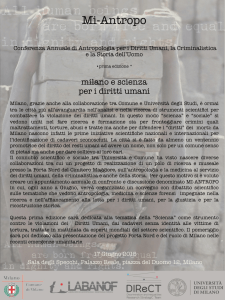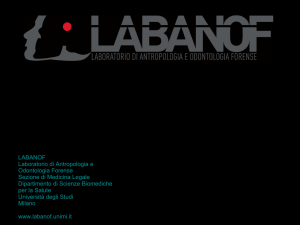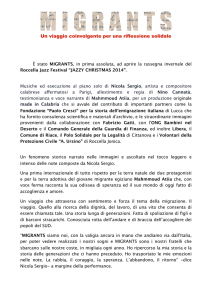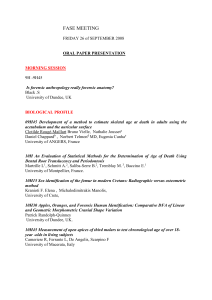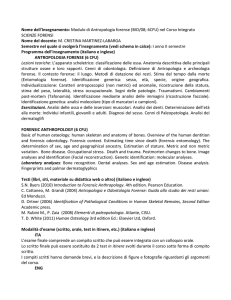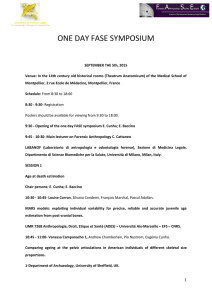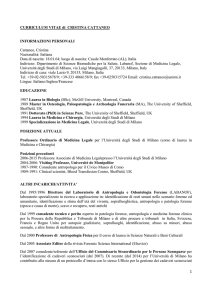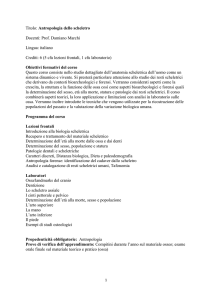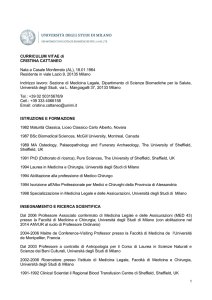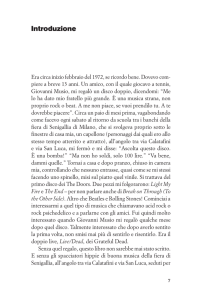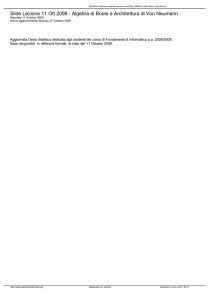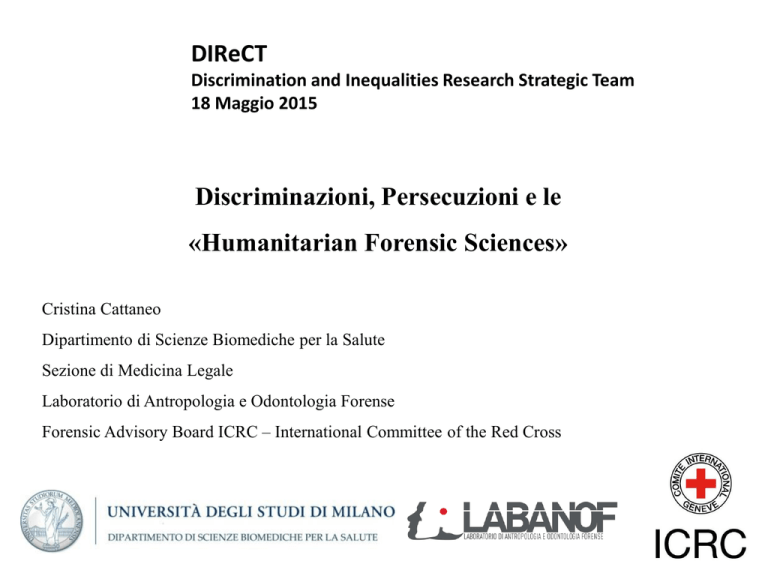
DIReCT
Discrimination and Inequalities Research Strategic Team
18 Maggio 2015
Discriminazioni, Persecuzioni e le
«Humanitarian Forensic Sciences»
Cristina Cattaneo
Dipartimento di Scienze Biomediche per la Salute
Sezione di Medicina Legale
Laboratorio di Antropologia e Odontologia Forense
Forensic Advisory Board ICRC – International Committee of the Red Cross
Medicina e Scienze
Fame e
Nutrizione:
agraria,
biologia
Torture,
Violenza:
Malattie:
medicina,
epidemiologia
scienze
forensi,
medicina
legale
Violazione dei Diritti Umani - Discriminazione
Convenzione di Ginevra (relativa allo status di rifugiato politico)
Persecuzione: art. 9 direttiva qualifiche, art. 7 D.lgs 251/2007
Persecuzione: gravi violazioni di diritti umani fondamentali;
pluralità di misure discriminatorie o altrimenti pregiudizievoli per la
persona che se sommate o protratte nel tempo rendono la vita
intollerabile
Motivi della persecuzione
- «Razza», Etnia
- Nazionalità
- Religione
- Opinione politica
- Appartenenza a gruppo sociale
Discriminazione
Persecuzione
United Nations
General Assembly
•
The Special Rapporteur acknowledges that there are credible and human rightsfriendly forensic and other scientific alternatives which have been proven to
achieve the desired results in law enforcement and crime prevention than torture
and cruel, inhuman and degrading treatment. Scientific advances have made
possible the provision of evidence to corroborate evidence that torture has been
administered; hence these new techniques are important tools for achieving
accountability. The Special Rapporteur wishes to further develop linkages
between science and forensics as an effective alternative to be employed in law
enforcement, countering terrorism and effective criminal prosecution.
• we need to establish the highest possible
standards for expert forensic testimony to be
used in such proceedings, including procedural
guarantees but also knowledge and sharing of
scientific and technological state of the art
Juan E. Méndez
Special Rapporteur on the question of torture and
other cruel, inhuman or degrading treatment or
punishment
Prospettiva scientifica + giuridica + politica + sociologica + culturale………
Maltrattamento, sfruttamento e pornografia minorile
Minori non accompagnati
Tortura
Milano protocol
• Sportello
stranieri/rifugiati
• Cooperative
• (Terre nuove, Farsi
prossimo, Casa della
Carità…)
• Valutazione
• Terapia
• Valutazione esiti
traumi
• Terapia
• Diagnosi di Età
COMMISSIONE TERRITORIALE
MINORI NON ACCOMPAGNATI
antropologia culturale, etnologia, demografia,
geografia
I DIRITTI DEI MORTI
Fosse comuni in Bosnia
Sud America,
«Desaparecidos»
I comuni ‘eserciti di senza nome’
I barconi del Mediterraneo
CHI SE NE OCCUPA (SE NE DEVE OCCUPARE) ?
Stato
Interpol
ICRC
International Committee of the Red Cross
ICMP
International Committee for Missing Persons
IOM
International Organisation for Migration
Altre NGO
Vuoti normativi
November 22-23, 2013
ICRC
FIRST CONFERENCE ON THE MANAGEMENT AND
IDENTIFICATION OF UNIDENTIFIED DECEDENTS, WITH AN
EMPHASIS ON DEAD MIGRANTS:
THE EXPERIENCE OF EUROPEAN
MEDITERRANEAN COUNTRIES
Aula Magna, Sezione di Medicina Legale
Dipartimento di Scienze Biomediche per la Salute
Università degli Studi di Milano
Via Mangiagalli, 37 - Milano
• increasing the necessary political and institutional awareness and
support, at national, regional and international levels, required for
preventing and resolving the tragedy of unidentified dead migrants
recovered from the Mediterranean Sea
• improving the communication, coordination and cooperation of
forensic and investigative agencies involved in the recovery,
analysis, documentation and management of decedent migrants
• ensuring the use of standardized procedures for the forensic
analysis and documentation of the dead by all forensic and
investigative agencies and practitioners involved in the
management of dead migrants
• creating centralized data bases with information on unidentified
dead and the missing reported in the region. These data bases
should be searchable and accessible by various agencies, including
humanitarian organisations, for servicing the humanitarian plight of
bereaved families (6)
• involving Governments and institutions of countries of origin of
migrants in the efforts to identify and repatriate their dead
nationals
The forgotten tragedy of unidentified dead in the Mediterranean.
Cattaneo C, Tidball Binz M, Penados L, Prieto J, Finegan O, Grandi M.
Forensic Sci Int. 2015 May;250:e1-2. doi: 10.1016/j.forsciint.2015.02.007. Epub 2015 Feb 12
Paragraph 6.8 in: The "left-to-die boat":
actions and reactions. Doc. 13532, 9 June
2014, Adopted by the Parliamentary
Assembly of the Council of Europe on 24 June
2014 (accessed 1 September 2014
http://assembly.coe.int/nw/xml/XRef/X2HXref-ViewPDF.asp?FileID=21024&lang=en)
FIRST ITALIAN/EUROPEAN EXPERIMENT
LAMPEDUSA OCTOBER 3 2013 366 victims
LAMPEDUSA OCTOBER 11 2013 21 victims
PROTOCOLLO D’INTESA TRA
GOVERNO ITALIANO
Commissario Straordinario
per le Persone Scomparse
Libertà Civili
UNIVERSITA’ DEGLI STUDI
DI MILANO
ROMA 1-2 OCTOBER 2014
a.
b.
c.
Organisation of PM data collected by the Polizia Scientifica DVI team for viewing and quick
matching
Calls to relatives through National Red Cross, ICRC, OIM, Amnesty International, CEIFondazione Migrantes, Borderline Europe, Comitato 3 Ottobre
Interviews and data collection at set dates in Rome and then Milano – October 1 / 2 2014;
December 4 / 5 2014; February 4 2015; April 23 / 24 2015
pathologist
odontologist
geneticist
anthropologist
psychologist
police expert
interpreter
AM DATA COLLECTION
(personal descriptors, photos (social
networks), videos, xrays, dental and clinical
documentation, samples for DNA analysis,
etc.)
d. AM data on 54 missing related to the incidents of October 2013 collected from
relatives coming from 7 different countries: Italy, Switzerland, Sweden, Norway, Denmark,
Germany, Canada
e. 10 matches/IDs so far through primary (dental) and secondary methods;
DNA in progress; 9 other possible matches
DIReCT
Discrimination and Inequalities Research Strategic Team
Soluzioni, anche con l’integrazione delle scienze
biomediche,
alle
problematiche
di
discriminazione e persecuzione per
«Razza» o Etnia
Nazionalità
Religione
Opinione politica
Appartenenza a gruppo sociale
Specie

